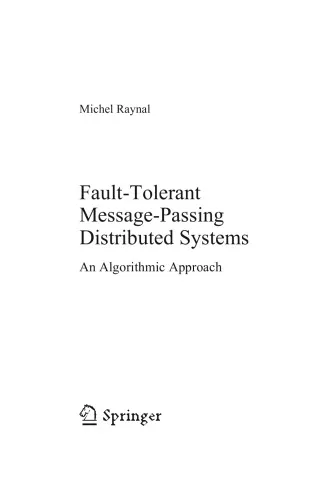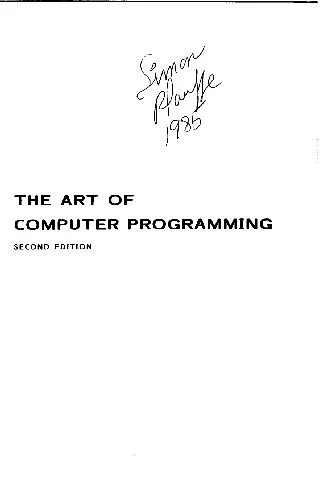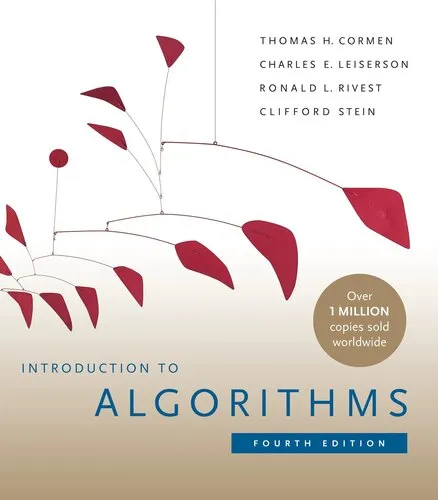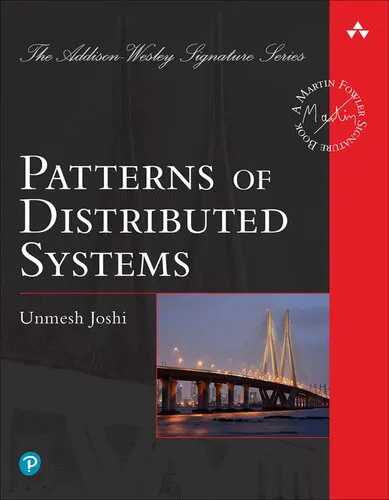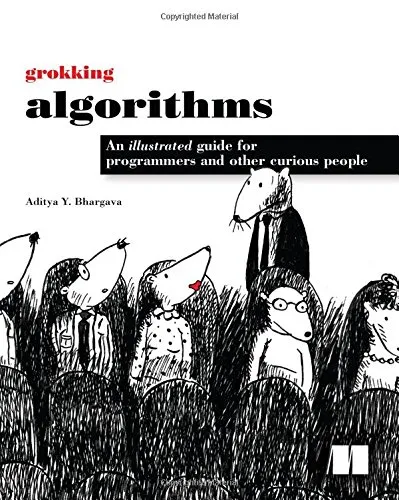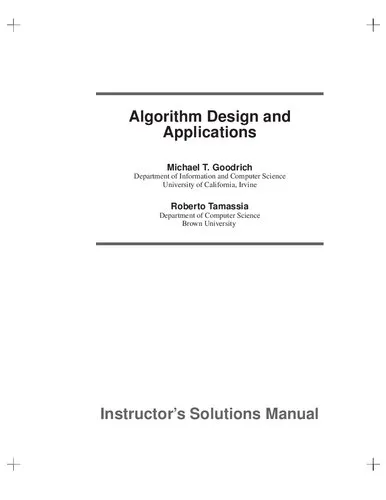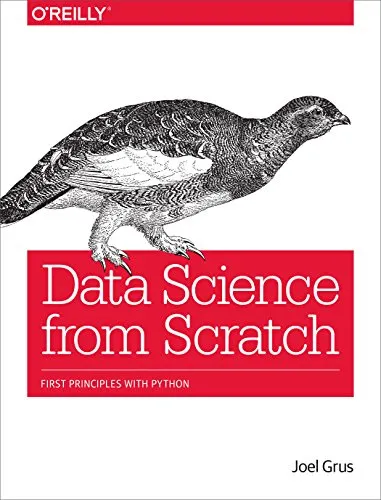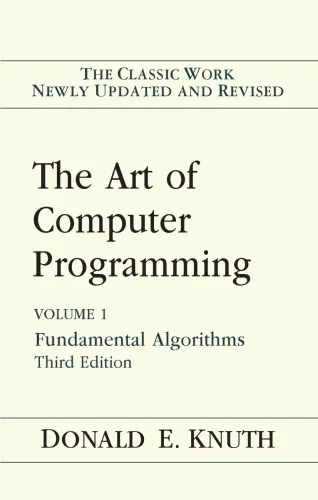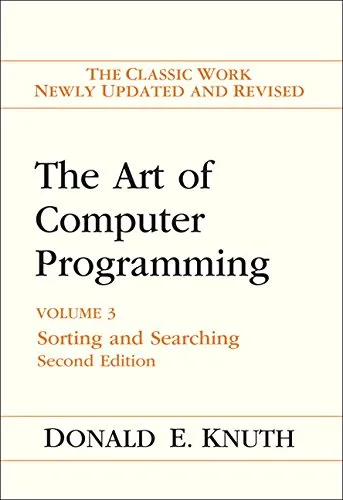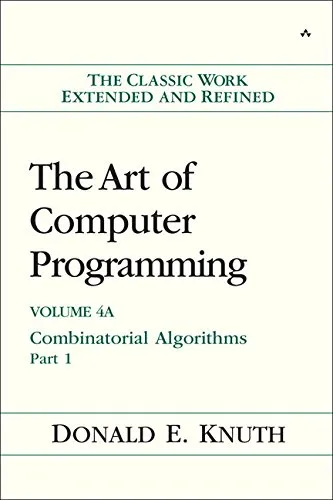Fault-Tolerant Message-Passing Distributed Systems. An Algorithmic Approach
4.0
بر اساس نظر کاربران

شما میتونید سوالاتتون در باره کتاب رو از هوش مصنوعیش بعد از ورود بپرسید
هر دانلود یا پرسش از هوش مصنوعی 2 امتیاز لازم دارد، برای بدست آوردن امتیاز رایگان، به صفحه ی راهنمای امتیازات سر بزنید و یک سری کار ارزشمند انجام بدینکتاب های مرتبط:
معرفی کتاب ‘Fault-Tolerant Message-Passing Distributed Systems. An Algorithmic Approach’
کتاب 'Fault-Tolerant Message-Passing Distributed Systems. An Algorithmic Approach' اثری برجسته در زمینه سیستمهای توزیعشده با امکانات خطا تحمل در محیطهای message-passing است. این کتاب به تحلیل الگوریتمیک شبکههای پیچیده میپردازد و برای دانشجویان، پژوهشگران و مهندسین کامپیوتر که به طراحی و پیادهسازی سیستمهای توزیعشده پایدار و قابل اعتماد علاقمندند، نوشته شده است.
خلاصهای از محتوای کتاب
کتاب به بررسی مفاهیم کلیدی و اصول اساسی مهندسی سیستمهای توزیعشده میپردازد. نویسنده به تجزیه و تحلیل روشهای مختلف حمل و نقل پیامها در محیطهای خطا پذیر و ارتباط آنها با مفهوم communication و synchronization میپردازد. کتاب مفاهیم پیچیدهای همچون consensus، agreement و broadcast را پوشش میدهد و به دنبال توضیح روشهای نوین برای رسیدن به fault-tolerance است.
مباحثی همچون atomic broadcast، primary-backup، و quorum systems به صورت گسترده مورد بررسی قرار گرفتهاند. نویسنده با بهرهگیری از مثالهای کاربردی و ارائه کدهای نمونه، درک عمیقتری از پیادهسازی و مشکلات موجود در این حوزه فراهم میآورد.
نکات کلیدی
- درک بهتر از چگونگی عملکرد سیستمهای توزیعشده در شرایط ناپایدار و محیطهای نامطمئن
- آشنایی با استراتژیهای گوناگون برای پیادهسازی الگوریتمهای توافق و broadcast
- تعیین ارتباطات بین synchronization و communication در سیستمهای پیچیده
نقلقولهای معروف از کتاب
"The key to fault-tolerance is redundancy and strategic planning in message passing."
"In distributed systems, achieving consensus despite failures is the core challenge."
چرا این کتاب مهم است؟
این کتاب با ارائه دیدگاههای نوین و الگوریتمهای جدید، به یکی از منابع اصلی و معتبر در حوزه سیستمهای توزیعشده تبدیل شده است. از آنجا که تکنولوژیهای نوین به سمت توسعه سیستمهای پیچیدهتر حرکت میکند، نیاز به درک عمیقتر و روشهای نوآورانهتر برای مقابله با مشکلات و چالشها احساس میشود. این کتاب با پوشش جامع از مفاهیم نظری و کاربردی، نقش مهمی در ارتقای دانش و مهارتهای مرتبط با طراحی و پیادهسازی سیستمهای مقاوم در برابر خطا ایفا میکند.
Welcome to an in-depth exploration of "Fault-Tolerant Message-Passing Distributed Systems. An Algorithmic Approach." This book is a comprehensive resource that delves into one of the most compelling areas of computer science: distributed systems. In today's interconnected world, where systems are becoming increasingly decentralized, the need for robust, fault-tolerant algorithms is more critical than ever. This book provides a detailed examination of the principles and practices that make distributed systems resilient to failures.
Detailed Summary of the Book
"Fault-Tolerant Message-Passing Distributed Systems. An Algorithmic Approach" is meticulously crafted to serve both as an academic textbook and a reference guide for professionals in the field. It lays out the foundational concepts essential to understanding distributed systems and progressively builds on these concepts with advanced topics. The book covers a wide range of subjects, from core properties of distributed systems such as consistency and availability to more nuanced topics like asynchronous and synchronous messaging.
The author explains the challenges in achieving coordination among distributed nodes, providing insight into algorithms for consensus and agreement in the face of system failures. Each chapter is structured to first introduce the problem space, followed by detailed algorithmic solutions, and concludes with practical examples and exercises that reinforce learning. The book explores a variety of fault-tolerance techniques, including redundancy, checkpointing, and replication, and discusses their trade-offs and efficiencies.
Key Takeaways
- Understanding the intrinsic challenges in designing distributed systems that can withstand node failures and network partitions.
- A comprehensive examination of consensus algorithms, such as Paxos and Raft, and their applications in real-world systems.
- An in-depth look into message-passing paradigms and how they can be leveraged for building resilient distributed architectures.
- Exploration of advanced fault-tolerance strategies and how they can be implemented to enhance system reliability.
- Insights into the trade-offs between consistency and availability when designing systems that adhere to the CAP Theorem.
Famous Quotes from the Book
"In a distributed system, failure is not an exception condition but the normal state, and designing around this premise is essential for building resilient systems."
"Agreement in a distributed system is both the problem and the solution. How we navigate this reflects the essence of our algorithmic approach."
Why This Book Matters
In the era of cloud computing and microservices, the principles presented in this book are paramount. It arms practitioners and students alike with the knowledge to tackle complex challenges in distributed computing environments, where failures are inevitable. By emphasizing algorithmic solutions, the book not only helps in comprehending theoretical underpinnings but also translates these concepts into practical, implementable strategies.
As distributed systems become a staple of technological infrastructure, understanding fault tolerance is no longer optional—it's a necessity. This book demystifies the complexity of distributed systems design and equips readers with the tools needed to design applications that remain robust in the face of adversity.
دانلود رایگان مستقیم
شما میتونید سوالاتتون در باره کتاب رو از هوش مصنوعیش بعد از ورود بپرسید
دسترسی به کتابها از طریق پلتفرمهای قانونی و کتابخانههای عمومی نه تنها از حقوق نویسندگان و ناشران حمایت میکند، بلکه به پایداری فرهنگ کتابخوانی نیز کمک میرساند. پیش از دانلود، لحظهای به بررسی این گزینهها فکر کنید.
این کتاب رو در پلتفرم های دیگه ببینید
WorldCat به شما کمک میکنه تا کتاب ها رو در کتابخانه های سراسر دنیا پیدا کنید
امتیازها، نظرات تخصصی و صحبت ها درباره کتاب را در Goodreads ببینید
کتابهای کمیاب یا دست دوم را در AbeBooks پیدا کنید و بخرید
1423
بازدید4.0
امتیاز0
نظر98%
رضایتنظرات:
4.0
بر اساس 0 نظر کاربران
Questions & Answers
Ask questions about this book or help others by answering
No questions yet. Be the first to ask!
